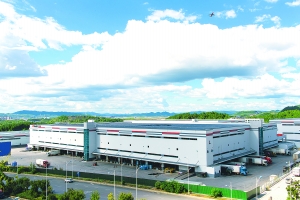
Since its establishment in 2014, the Guizhou Shuanglong Airport Economic Zone has promoted the construction of infrastructure and created a high-quality business environment, convincing many enterprises to set up operations there. Its airport economy is booming.
The economic zone is currently thriving, with rapid economic and social development, massive changes in urban and rural areas, and gradually rising major economic indicators.

The Shuanglong Ecological Park boasts lush trees. [Photo/Guiyang Daily]
In 2017, the economic zone was approved as the eighth national-level airport economic demonstration zone in the country.
Revolving around the Guiyang Longdongbao International Airport, the economic zone has constructed an airport industrial layout for an international aviation hub, airport high-tech industrial zone, airport modern service industry hub, airport modern logistics hub, and airport international living and leisure zone.
The industrial development trajectory of high-end equipment manufacturing, electronic information manufacturing, and aviation-preferred ecological food has been clarified, and infrastructure construction has been promoted to expand and strengthen the airport economy.
The economic zone is currently home to the headquarters of such airlines as China Southern Airlines, China Airlines, Colorful Guizhou Airlines, and Tianjin Airlines.

Guiyang SF Fengtai Industrial Park in the Shuanglong zone. [Photo/Guiyang Daily]
The layout of the first phase of its aviation logistics park is now nearly completed, with eight domestic industry leaders including SF Express, Cainiao and YTO Express setting up operations in the park.
A high-end modern comprehensive production and service industry system in the economic zone has also been established, and a number of food and pharmaceutical companies are developing steadily.
The economic zone is currently home to 14 Fortune Global 500 companies, three Chinese top 500 companies, and 15 high-tech companies involved in high-end manufacturing, headquarters economy, modern logistics, big data and modern services.
In addition, the economic zone has focused on people's livelihoods, improved public services such as education and medical care, and promoted the construction of medical complexes and public transportation infrastructure.